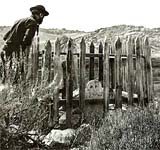The Frontier Experience in the American Midwest: Greater Illinois to 1860
No details available.
No details available.
Professor Maria Montoya of New York University examines diaries of women who join the trip along the Oregon Trail. She finds heartwrenching stories of women who lost loved ones but could not stop to bury them.
This feature is no longer available.
This iCue Mini-Documentary introduces the Second Great Awakening. In the first half of the 19th century, the U.S. underwent a wave of religious revivals, the largest outpouring of religious sentiment since the American Revolution.
This feature is no longer available.
The Memorial, located in a small park, marks the site of the birthplace of James Butler "Wild Bill" Hickok.
Website offers no specific information on interpretative services available at the site.
To many, the Great Plains are part of the Great Flyover, whose landscape and history alike are flat and featureless. However, in this region in the middle of the nation, cultures have mingled and clashed for thousands of years. This seminar will focus on the 19th century, though also examining the first peoples and the continuing cultural exchanges of the 20th century. The seminar will begin with the physical setting, plants, and animals, and consider early humans in both Native American traditions and anthropological/archaeological studies. Europeans arriving in the 16th century accelerated the long history of change and evolution, initiating more than three centuries of converging peoples and cultures, new centers of power, flourishing trade, calamitous epidemics, and cultural and material intrusions from across the planet. Participants will visit Bent's Fort to see a cultural crossroads illustrated through one family. They will also examine cattle ranching, homesteading, scientific explorations, and the depiction of the plains in art.
Led by Patty Limerick, this seminar uses focused case studies to explore the larger picture of environmental history, a subject that has grown increasingly complex as historians deepen their understanding of the vast role of "anthropogenic change" (also known as "history") in reconfiguring the places and processes thought of as "natural." Much of the seminar explores the transformation of attitudes, from the assessment of North American landscapes and resources by early settlers to the recognition of the changing "baseline" of global warming, along with a reconsideration—and revision—of the usual polarity-pitting utilitarian approaches in opposition to preservationist approaches to the management of nature. With guest speakers drawn from the University of Colorado's widely respected environmental studies program, the roles of naturalists and scientists in shaping American thinking about nature will receive particular attention, as will changes in the production and consumption of energy, a fundamental matter in environmental history. The concluding field trip to Rocky Mountain National Park gives the themes of the lectures and discussions a down-to-earth grounding in a visit to one of the most popular units in the nation's public lands, while close attention to John McPhee's Encounters with the Archdruid provides a framework for drawing lessons from the past to enhance the quality of contemporary environmental decision-making.

These two collections illuminate life on the Great Plains from 1862 to 1912. The nearly 3,500 glass plate negatives depict everyday life in central Nebraska, with images of businesses, farms, people, churches, and fairs in four counties. Approximately 318 letters describe the sojourn of the Uriah Oblinger family through Indiana, Nebraska, Minnesota, Kansas, and Missouri as they traveled to establish a homestead. Letters discuss such topics as land, work, neighbors, crops, religious meetings, grasshoppers, financial troubles, and Nebraska's Easter Blizzard of 1873.
A 1,000-word essay describes the letter collection and the lives of the principal correspondents. Biographical notes are available for more than 120 of the people who corresponded with the Oblingers or who were mentioned in the letters.

Diaries documenting the westward treks of 45 men and four women during the period of the California Gold Rush and the westward migration of Mormonism are presented in this site. Although most of these travelers took either the California or Mormon trails, a few diaries provide accounts describing life on trails to Oregon and Montana.
The diaries are complemented by 82 photographs and illustrations in addition to 43 maps, including an interactive map displaying trails, cities, rivers, and landmarks. There are seven published guides, two essays on the Mormon and California trails, brief biographies of most of the diarists, and a list of suggested readings. This is an excellent collection of materials that documents 49 individual perspectives on a movement that encompassed an estimated 500,000 people.